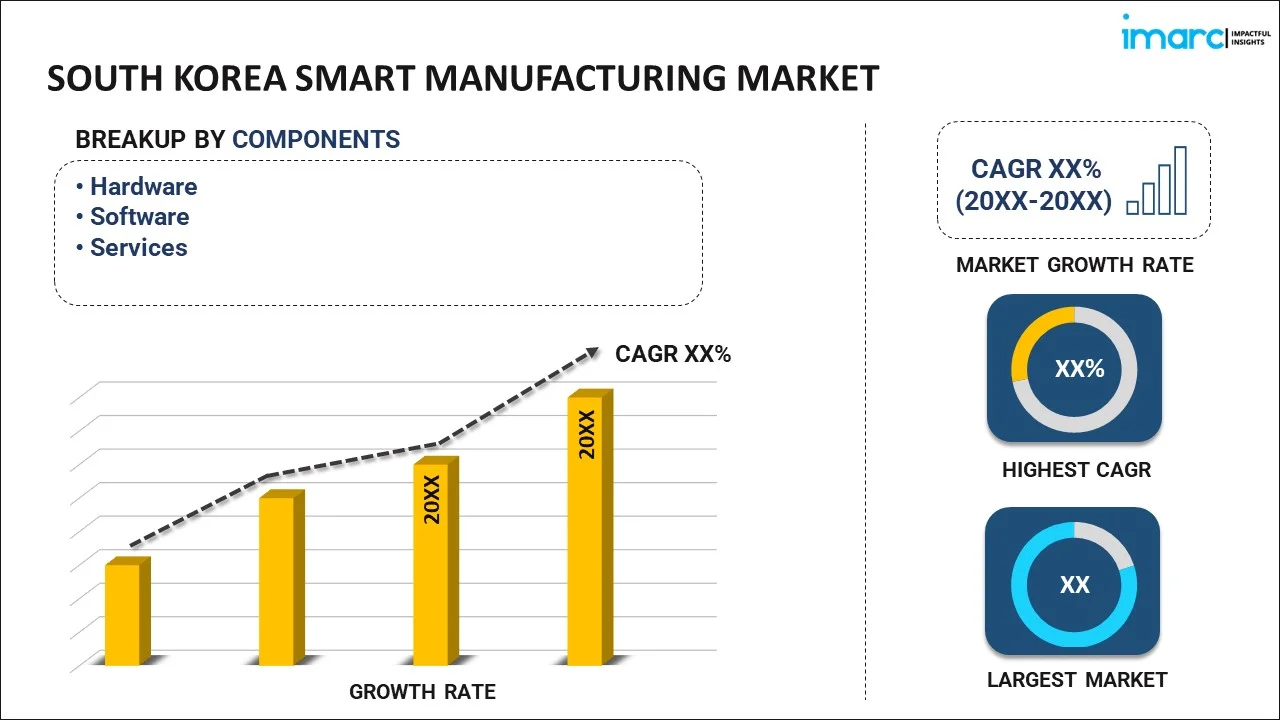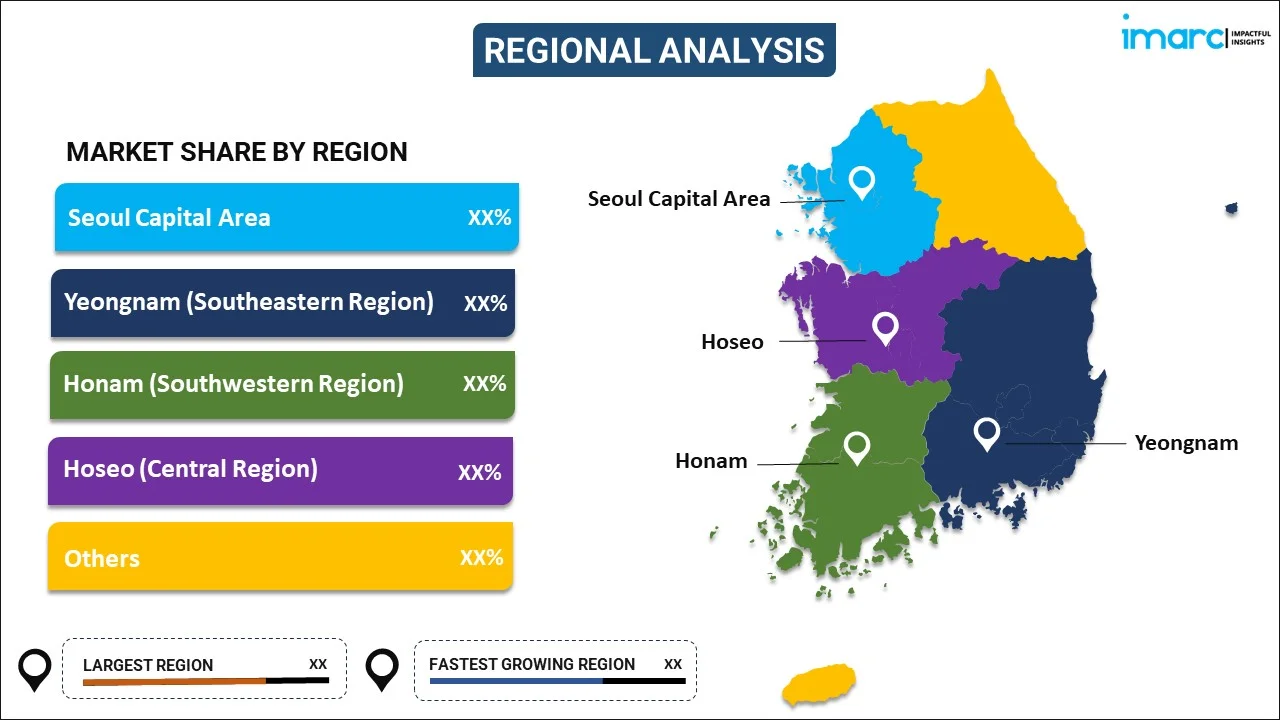
South Korea Smart Manufacturing Market Report by Component (Hardware, Software, Services), Technology (Machine Execution Systems, Programmable Logic Controller, Enterprise Resource Planning, SCADA, Discrete Control Systems, Human Machine Interface, Machine Vision, 3D Printing, Product Lifecycle Management, Plant Asset Management), End Use (Automotive, Aerospace and Defense, Chemicals and Materials, Healthcare, Industrial Equipment, Electronics, Food and Agriculture, Oil and Gas, and Others), and Region 2025-2033
Market Overview:
South Korea smart manufacturing market size reached USD 6,827.6 Million in 2024. Looking forward, IMARC Group expects the market to reach USD 22,366.3 Million by 2033, exhibiting a growth rate (CAGR) of 14.09% during 2025-2033. The increasing government's active support through initiatives and policies, the demand for customization and flexibility in manufacturing processes, and the widespread adoption of 5G technology represent some of the key factors driving the market.
|
Report Attribute
|
Key Statistics
|
|---|---|
|
Base Year
|
2024
|
|
Forecast Years
|
2025-2033
|
|
Historical Years
|
2019-2024
|
| Market Size in 2024 | USD 6,827.6 Million |
| Market Forecast in 2033 | USD 22,366.3 Million |
| Market Growth Rate 2025-2033 | 14.09% |
Smart manufacturing represents a significant evolution in the industrial landscape, leveraging advanced technologies to create highly intelligent and automated production processes. It encompasses a broad array of systems, including the Internet of Things (IoT), artificial intelligence (AI), robotics, big data analytics, and cloud computing. These technologies collectively contribute to the development of a connected, responsive, and efficient manufacturing environment. In Smart Manufacturing, machines are not just conduits of manual input but are equipped with sensors and connectivity to communicate and make decisions. The advantages of this approach are manifold. It leads to increased productivity, enhanced quality control, reduced operational costs, and greater flexibility in production. Additionally, it allows for real-time monitoring and predictive maintenance, decreasing downtime and extending the life of equipment. Integrating digital information from many different sources and locations enables a more agile response to changes in market demand and supply chain dynamics, thereby improving overall business performance. This approach is revolutionizing the manufacturing sector, setting new standards for efficiency, productivity, and innovation.
South Korea Smart Manufacturing Market Trends:
The smart manufacturing market in South Korea is majorly driven by the country's strong focus on innovation and technology, combined with its robust manufacturing base. Along with this, the government's active support through initiatives and policies that encourage the adoption of advanced manufacturing technologies is favoring the market. This support includes substantial investments in research and development, fostering a conducive environment for technological advancements. In addition, the increasing demand for customization and flexibility in manufacturing processes is positively influencing the market. South Korean companies are leveraging smart manufacturing technologies to meet these demands, allowing for more personalized and varied production without sacrificing efficiency. Moreover, the escalating need for efficient resource management and sustainability in manufacturing processes is encouraging companies towards smart manufacturing solutions, which offer optimized energy usage and reduced waste. Apart from this, the widespread adoption of 5G technology in South Korea is also playing a crucial role, offering high-speed connectivity that is essential for the real-time data transfer and communication required in smart manufacturing environments. In confluence with this, the increasing integration of AI and IoT in industrial applications is transforming production lines into intelligent systems capable of predictive maintenance, quality control, and autonomous decision-making. Therefore, this is significantly supporting the market. Furthermore, South Korea's focus on developing a highly skilled workforce proficient in digital technologies is ensuring that the human aspect of smart manufacturing is prominent. This trend is creating a synergy between human expertise and automated processes, further creating a positive market outlook. Some of the other factors driving the market include technological advancements and changing consumer preferences.
South Korea Smart Manufacturing Market Segmentation:
IMARC Group provides an analysis of the key trends in each segment of the market, along with forecasts at the country level for 2025-2033. Our report has categorized the market based on component, technology, and end use.
Component Insights:

- Hardware
- Software
- Services
The report has provided a detailed breakup and analysis of the market based on the component. This includes hardware, software, and services.
Technology Insights:
- Machine Execution Systems
- Programmable Logic Controller
- Enterprise Resource Planning
- SCADA
- Discrete Control Systems
- Human Machine Interface
- Machine Vision
- 3D Printing
- Product Lifecycle Management
- Plant Asset Management
A detailed breakup and analysis of the market based on the technology have also been provided in the report. This includes machine execution systems, programmable logic controller, enterprise resource planning, SCADA, discrete control systems, human machine interface, machine vision, 3D printing, product lifecycle management, and plant asset management.
End Use Insights:
- Automotive
- Aerospace and Defense
- Chemicals and Materials
- Healthcare
- Industrial Equipment
- Electronics
- Food and Agriculture
- Oil and Gas
- Others
The report has provided a detailed breakup and analysis of the market based on the end use. This includes automotive, aerospace and defense, chemicals and materials, healthcare, industrial equipment, electronics, food and agriculture, oil and gas, and others.
Regional Insights:

- Seoul Capital Area
- Yeongnam (Southeastern Region)
- Honam (Southwestern Region)
- Hoseo (Central Region)
- Others
The report has also provided a comprehensive analysis of all the major regional markets, which include Seoul Capital Area, Yeongnam (Southeastern Region), Honam (Southwestern Region), Hoseo (Central Region), and Others.
Competitive Landscape:
The market research report has also provided a comprehensive analysis of the competitive landscape. Competitive analysis such as market structure, key player positioning, top winning strategies, competitive dashboard, and company evaluation quadrant has been covered in the report. Also, detailed profiles of all major companies have been provided.
South Korea Smart Manufacturing Market Report Coverage:
| Report Features | Details |
|---|---|
| Base Year of the Analysis | 2024 |
| Historical Period | 2019-2024 |
| Forecast Period | 2025-2033 |
| Units | Million USD |
| Scope of the Report | Exploration of Historical and Forecast Trends, Industry Catalysts and Challenges, Segment-Wise Historical and Predictive Market Assessment:
|
| Components Covered | Hardware, Software, Services |
| Technologies Covered | Machine Execution Systems, Programmable Logic Controller, Enterprise Resource Planning, SCADA, Discrete Control Systems, Human Machine Interface, Machine Vision, 3D Printing, Product Lifecycle Management, Plant Asset Management |
| End Uses Covered | Automotive, Aerospace and Defense, Chemicals and Materials, Healthcare, Industrial Equipment, Electronics, Food and Agriculture, Oil and Gas, Others |
| Regions Covered | Seoul Capital Area, Yeongnam (Southeastern Region), Honam (Southwestern Region), Hoseo (Central Region), Others |
| Customization Scope | 10% Free Customization |
| Post-Sale Analyst Support | 10-12 Weeks |
| Delivery Format | PDF and Excel through Email (We can also provide the editable version of the report in PPT/Word format on special request) |
Key Questions Answered in This Report:
- How has the South Korea smart manufacturing market performed so far and how will it perform in the coming years?
- What has been the impact of COVID-19 on the South Korea smart manufacturing market?
- What is the breakup of the South Korea smart manufacturing market on the basis of component?
- What is the breakup of the South Korea smart manufacturing market on the basis of technology?
- What is the breakup of the South Korea smart manufacturing market on the basis of end use?
- What are the various stages in the value chain of the South Korea smart manufacturing market?
- What are the key driving factors and challenges in the South Korea smart manufacturing?
- What is the structure of the South Korea smart manufacturing market and who are the key players?
- What is the degree of competition in the South Korea smart manufacturing market?
Key Benefits for Stakeholders:
- IMARC’s industry report offers a comprehensive quantitative analysis of various market segments, historical and current market trends, market forecasts, and dynamics of the South Korea smart manufacturing market from 2019-2033.
- The research report provides the latest information on the market drivers, challenges, and opportunities in the South Korea smart manufacturing market.
- Porter's five forces analysis assist stakeholders in assessing the impact of new entrants, competitive rivalry, supplier power, buyer power, and the threat of substitution. It helps stakeholders to analyze the level of competition within the South Korea smart manufacturing industry and its attractiveness.
- Competitive landscape allows stakeholders to understand their competitive environment and provides an insight into the current positions of key players in the market.
Need more help?
- Speak to our experienced analysts for insights on the current market scenarios.
- Include additional segments and countries to customize the report as per your requirement.
- Gain an unparalleled competitive advantage in your domain by understanding how to utilize the report and positively impacting your operations and revenue.
- For further assistance, please connect with our analysts.
 Request Customization
Request Customization
 Speak to an Analyst
Speak to an Analyst
 Request Brochure
Request Brochure
 Inquire Before Buying
Inquire Before Buying




.webp)




.webp)












